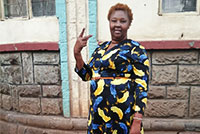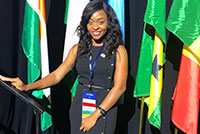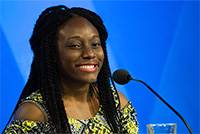Women human rights defenders
OHCHR and women’s human rights and gender equality
Who are women human rights defenders?
Women human rights defenders (WHRDs) are all women and girls working on any human rights issue ("women defenders" and "girl defenders"), and people of all genders who work to promote women’s rights and rights related to gender equality.
It also includes any civil society actors who may not self-identify as human rights defenders or those who work on non-traditional human rights fields (journalists, health workers, environmental activists, peacebuilders, private actors, development and humanitarian actors, etc.). It includes lesbian, gay, transgender and intersex (LGBTI) activists, as issues related to sexual orientation and gender identity are part of achieving gender equality. Many other terms may be employed by individuals to identify themselves and their work in these areas for a variety of reasons, including those related to the context and/or languages in which they work where translations may vary.
Pivotal actors in driving genuine social change
WHRDs individual and collective action has been pivotal in addressing discrimination and inequality and advancing civil, political, economic, social and cultural rights, including in the context of prevention, peace and security and sustainable development. They have been at the forefront of social justice movements towards genuine social changes that have benefited everyone.
Landmark resolution
The Declaration on Human Rights Defenders (HRDs) recognizes the important role of HRDs, including women human rights defenders, and outlines relevant rights of all HRDs and obligations of States. In recognition of the gender-specific challenges they face, the UN General Assembly furthermore adopted a landmark resolution on the protection of women human rights defenders.
Specific challenges facing women human rights defenders
Although restrictions of and attacks on civic space affect all defenders, WHRDs are specifically targeted and face additional and specific obstacles, risks, violations and impacts, which are shaped by:
- who they are (women, girls, LGBTI people, etc.),
- who they identify with or are part of (such as the feminist movement), and/or
- what they are working to advance (such as the human rights of LGBTI people).
Human rights challenges faced include:
- gender-based discrimination
- gender-specific threats
- gender-specific violence
- targeting of family members and loved ones
- hostility by the general population and authorities
- harmful anti-gender narratives and defamation campaigns
- exclusion, marginalization, under-recognition and underfunding
- barriers to accessing decision-making spaces and platforms
- stigmatization and ostracism by community leaders, faith-based groups, families and communities
- gender-specific challenges and violence online and in digital spaces
Why women human rights defenders are targeted
The reasons behind the targeting of WHRDs are multi-faceted and complex and depend on the specific context in which the WHRDs are working.
Often, the work of WHRDs is seen as threatening the status quo and challenging traditional notions of family and gender roles. This can lead to stigmatization, ostracism, exclusion and hostility by State and non-State actors, including community leaders and family members who consider them to be threatening religion, honour or culture through their work.
In addition, the work itself, their participation in feminist movements, or what they are striving to achieve—for instance, the realization of women’s rights or other rights related to gender equality—also makes them targets for attack, seeking to discourage WHRDs, individually and collectively, from pursuing their work.
Stronger support and protections needed
The State has the primary responsibility to ensure an enabling environment for all human rights defenders and to protect defenders from threats and attacks. The international community as well as UN presences on the ground also have a responsibility to support, engage meaningfully and protect them.
Prompt investigation of intimidation, threats, violence and other abuses against women human rights defenders should be undertaken. In practice, however, WHRDs are often left without effective, inclusive and gender-responsive protection mechanisms.
Given the unique challenges this group of defenders face, it is important to deepen support and recognition of their work, and strengthen protection mechanisms, including at local and international levels, to their specific concerns.
Latest news
Women human rights defenders are targeted twice over, Türk says
29 November 2023
Women human rights defenders face worsening violence, warns UN human rights expert
28 February 2019
Feature stories
Keeping women and girls in Kenya safe during COVID-19
2 February 2021
Tackling COVID-19 in Nigeria from a safety education angle
8 January 2021
On International Women’s Day, Stand With Her
7 March 2019
From Benin to Florida: Dr Joannie Bewa’s global fight for women’s education
5 March 2019
Studies, reports and papers
Brief for UN system on supporting women human rights defenders (5-pager), (2021)
On International Women’s Day, Stand With Her! (2021)
On the Frontlines: Defending Rights in the Time of COVID, (2020)
Report of the Special Rapporteur on the situation of women human rights defenders, (2019)
Civic space and effects of shrinking space on women human rights defenders in East Africa, (2019)
High Commissioner: impact of online violence on women human rights defenders - Statement at HRC Annual Full Day Discussion on the rights of women, 21 June 2018
Monitoring Manual Chapter 28: Monitoring and protecting the human rights of women
Fact Sheet on Human Rights Defenders: Protecting the Right to Defend Human Rights (available in all UN languages)
Related Issues
Special rapporteur on the situation of human rights defenders
Acts of intimidation and reprisal for cooperation with the United Nations in the field of human rights (ASG Reprisals mandate)
Protecting and expanding civic space
Videos
Volker Türk - WHRDs, 27 November 2023
Leading the fight for climate justice, 2 March 2021
Redefining gender norms, 2 March 2021
Statement by the High Commissioner for Human Rights, 8 March 2019
On International Women's Day, celebrating the millions of women
who’ve transformed our lives, 8 March 2019



